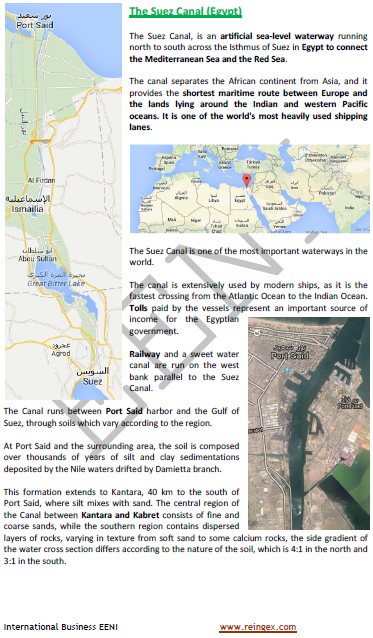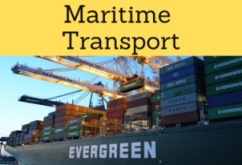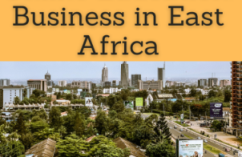Suez Canal: 8% of World Seaborne Trade
Suez Canal (Egypt): shortest route between the sub-Indian continent and Asia-Pacific Region

Logistics in Africa, Maritime Transport in Africa, East African Ports
The Suez Canal is one of the most heavily used Shipping lines in the World (8% of the World's seaborne trade).
- The Suez Canal (Egypt) is the shortest route between the sub-Indian continent and Asia-Pacific Region with European and Northern African markets
- The Suez Canal allows significant cost savings for vessels, both in terms of time and logistics

- Introduction to the Suez Canal
- The Suez Canal Authority
- Strategic importance of the Canal
- New Suez Canal
Sample - Suez Canal


The Subject “Suez Canal” is included within the curriculum of the following academic programs at EENI Global Business School:
Logistics Course: Maritime Transport.

Masters: Transport in Africa, Business in Africa.

Doctorate in African Business, Global Logistics.

Languages:  or
or  Canal de Suez. Summaries in
Canal de Suez. Summaries in  Canal de Suez
Canal de Suez  Canal de Suez.
Canal de Suez.
- By ex: from the Port of Tokyo to the Port of Rotterdam saving of 23% and 3.315 Nm (comparing Via Cape)
- Ships crossing the Suez Canal should pay tolls
- Interval between ships: 10-16 min (2-3 kilometers)
- Railway parallels to the Suez Canal
- Sea level channel (unnecessary flood gates)
- Six bypasses in Port Said, Ballah, Timsah, Deversoir, Bitter Lakes, and Kabret
- The Suez Canal was open in 1989. In 1956 was nationalized
- New Suez Canal Project. Shortening transit time from 18 hours to 11 hours
- Monthly Number of vessel: 1,411 (Jan 2015)
The Suez Canal belongs to the East African Economic Area.
Trans-African Corridors related to the Suez Canal:
More information about Egypt (EENI African Business Portal).
Egyptian Businessman:

(c) EENI Global Business School (1995-2025)
Top of this page









 WhatsApp
WhatsApp